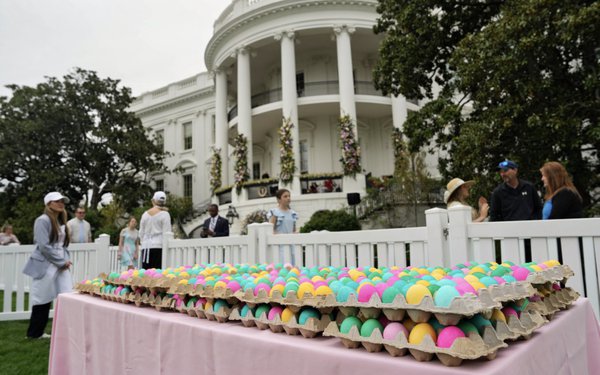
For the first time in history, the White
House solicited corporate sponsors for its annual Easter Egg Roll, which was held on Monday.
“The decision led some Trump opponents to suggest it is an ethics
violation,” according to USA Today. “Proceeds from companies that
paid for their names to be attached to the event benefit the nonprofit White House Historical Association, the lead organizer of the egg roll. The country's largest tech companies make up some of the
corporate sponsors, according to a list released
by the White House, including Amazon, Meta and YouTube.”
advertisement
advertisement
Amazon sponsored the “Reading Nook” and “Family Photo Opportunity,” while Meta sponsored
the “AI-Powered Experience and Photo Opportunity.” YouTube hosted the “Bunny Hop Stage.”
“Those sponsorships come as those Silicon Valley leaders, who
donated to Trump’s inaugural fund, have lost billions in value as markets -- from the NYSE to others across the globe -- have experienced volatility as a result of President Donald Trump’s
tariffs,” according to CNN Politics.
Sponsors who paid
$200,000 received a 30'x30' branded activation and four tickets to a brunch with the first lady and a choice of a meet and greet or White House tour. Packages were also available for $125,000 and
$75,000.
“Events company Harbinger prepared a 9-page brochure for prospective sponsors,” according to CBS News. "It offers sponsors 'media and PR exposure' in front of the White House
press corps on the South Lawn."
Other sponsors included companies trying to get President Trump’s attention.
“GALA, a blockchain company
sponsoring a ‘Digital White House Egg Hunt Game,’ has already been promoting its involvement in the event," according to Politico. “It is highlighting the game on its website next to a picture of the Easter Egg
Roll’s logo, saying the game is ‘bringing an added layer of fun to one of the most iconic events of the season.’”
Industry trade groups — including egg
farmers and candy makers — are also listed as event partners, and some have supported the event for decades.
The event features 30,000 real eggs, according to the
American Egg Board, and was created in 1976 at the request of America’s egg farmers, who desired to pool resources for national category-level egg marketing.
According to the
Bureau of Labor Statistics, the average retail price for a dozen eggs was $6.23 in March, though consumers in many areas have seen prices higher than $10. The New York
Times recently reported that eggs are so expensive that some Americans have been dyeing potatoes for
Easter, according to The Cut.
Emily Metz, the president and CEO of the
American Egg Board, told NBC that using real eggs for the event
“will not create additional strain on the nation’s egg supply or egg prices” because they only use small and medium eggs, which “are not meant for the retail and grocery
channels.”